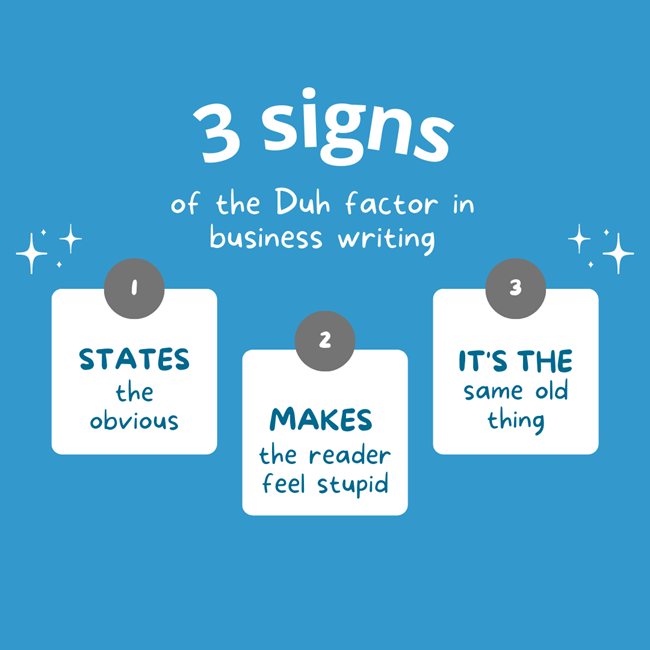 How often do you read a sentence and think – well, duh? Or perhaps it’s a heading or post on a social media platform. Not exactly the reaction the writer wants.
How often do you read a sentence and think – well, duh? Or perhaps it’s a heading or post on a social media platform. Not exactly the reaction the writer wants.
In business writing, the Duh factor is an easy trap to fall into.
- Sometimes it springs from lazy writing.
- Other times writers underestimate their audience.
- Or overestimate their own point of view.
The following are a few scenarios where the sneaky Duh factor may creep into unsuspecting business communication.
The Duh Factor
Business writing is like marriage. Sometimes it’s tough to keep it fresh. And there’s always some outside factor distracting you from what’s important.
So, consider this post your alert buzzer, warning you when the Duh factor is launching an attack. Three scenarios (as illustrated below) are common signs to look for.

1. States the obvious.
You’re trying to make a point. And you’re sincere in making that point, but somehow the Duh factor tiptoes into your words. Picture this scenario. The following ad pops up in your browsing.

The ad has its pluses.
- It’s simple and tells you what they do.
- Computer repair service. Sounds good. And so does the 30% off.
- But what about that opening line?
When your computer crashes, that’s a bad thing.

Has anyone ever viewed a computer crash as a good thing? Instead of stating the obvious, try a different approach.
- Share the emotion – Is there anything more frustrating than a computer crash?
- Or offer a benefit to the reader – We offer remote and on-site service repair.
- Slight changes remove the Duh factor.
2. Makes reader feel stupid.
You see it in blogs and responses to comments. That snarky, Well Duh attitude of the writer.
- Everyone knows that. Terms like, everyone, flaunt the writer’s Well Duh attitude.
- The solution is obvious. What’s obvious is that condescending tone.
- We already discussed that. A dismissive response attacks the person commenting.
How about this thought?
Making readers feel stupid is bad business.

3. It’s the same old thing.
Do you feel like we have run out of ideas?
- We read the same topics.
- And hear the same tired, overused phrases.
I support the idea that any idea is new to someone – BUT you need your own spin. Well, duh.
Take a different approach to a topic.
Think about your life and individual experiences. I guarantee you, no one else is an exact duplicate. Unless you stumble into a scientific cloning experiment.
So, because we are each different, you have a built-in uniqueness for the topic.
- Compare the topic to something you love to do – How freelancing is like skydiving.
- Share what was new to you about the topic.
- Get different perspectives. Interview others about the topic.
Create a new twist on clichés.
Ideas become clichés because, originally, they were so good everyone started using them. Create a new twist on an old cliché. Who knows? You may create a new one. 😊
Some clichés cross over to stereotypes, like a boomer being less than tech-savvy. So, use a tech-proficient boomer to discuss your techie topic.
Add a unique idea to that same tired list.
I love reading reviews that list “the best” software or marketing tools. But at times, it’s the same list of vendors or products. Well, duh.
- Sure, it could be because they are the best.
- But it may be that they feel safe.
- Or the writer has a certain bias.
Try discovering a new player to add to your list.
Regurgitating the same message in the same way bores readers.

Duh Eraser
Before you hit send – before you print – take out your Duh eraser.
- Remove the obvious.
- Erase the attitude.
- Replace the old.
Your readers will appreciate it.

What makes you mutter, Well, Duh?
Note: This post originally published on March 21, 2012. This March 3, 2023 version updates it. About time. Well, duh. 🙂
==================================
Helping you keep your business communication simple, clear, and uniquely yours.
==================================

“new to someone” is certainly true… reflected in the questions I get – over and over again. Which doesn’t mean I can’t find a new or newish way to answer them. Thanks… love the idea of a duh eraser – I’d buy one.
LOL, Anne. I’d buy one, too. Hmmm…new product idea. 😀
Too many of the well, duh’s arise because the writer is well, duh!
Don’t like the implications of that politically incorrect statement… don’t provide your readers with ammunition!
Cathy, you did a great job giving a new spin on business blog writing. Thank you for the ideas and for the twist.
Roy: LOL! Well. duh. 🙂
Ann: Thank you for the nice compliment. 🙂 Spin away!
It is to fall into response habits. I’m guilty of this with my students. I hear the same question so often it is easy to give a canned response. I believe writers have the same issue with their niche. It becomes almost too familiar. Thanks for the reminder, Cathy.
Whoops, the first sentence should state: It is easy to fall into response habits. I need to slow down. 🙂
Good example of how switching it up can change a ‘duh’ moment to an attention-grabbing one, Cathy.
We have this imaginary cape here we give to our daily Captain Obvious. Whenever one of us here at home says something completely obvious, we’re prone to saying “Get the cape!”
Might not be a bad thing for writing, huh? Well, DUH. 🙂
Wade – thanks for sharing your example – and trust me – typos are right at home here. 🙂
Sharon – thank you for the kudos 🙂
Lori – I love that – Cape to the rescue! 🙂
What a great point to consider before pushing “send” or “publish.” No one wants to be talked down to and some writers don’t realize that they’re writing that way. Now I have one more item on my writing checklist. Excellent post.
Hi Lisa: Thanks for the nice words. One last look never hurts, does it? 🙂 Thanks for stopping by, Lisa.
Hi, Cathy: Great article. I find I have to read everything out loud so my stuff doesn’t fall into the “duh” category. It’s sometimes challenging to gauge what people will know already when they read and what might fly over their heads, so giving the post a once-over before you publish is a great idea.
I feel like I have a lot of “duh” moments. It seems that I do better by taking time to really read what I am writing. Sometimes this requires reading drafts on different days.
Hi Pamela-reading out loud definitely helps. There’s a difference between keeping things basic and stating the obvious because you’re right, there are different levels of understanding.
Thanks for stopping by and sharing your thoughts. I do appreciate it.
Hi Kristen – I always let my writing simmer with one exception – my blog posts. I sometimes let them sit overnight, but too often I write them, put them in the queue, and let them go. It’s funny, I do blog posts for clients and would never do that, but I do with my own. Bad habit.
Thanks for sharing your tip, Kristen.
In my case, I often fall into the Duh when I write for myself instead of writing for the reader. Then, attitude steps in. Great points!
Great point yourself, Gustavo. 🙂 Thanks for sharing that insight.
P.S. Love the new avatar 🙂
Great points, Cathy! I’m probably I’m guilty of making readers say “Well Duh” a lot. Since I work with a lot of business owners who are just learning about blogging and social media, I’m used to having to spell things out. I should probably refer to your post here when I publish on my blog, though!
Well, duh! 🙂
Hi Kylie: Again, I like to believe (since it’s what I do here) 🙂 there is a difference between making something simple to understand and Well, duh, but then I was probably inspired by my own Well, duh moment. 🙂
Thanks for stopping by, Kylie.
Armi-that phrase was running though my mind throughout the whole post. 😀
Thanks for stopping by. Well, duh. 😉